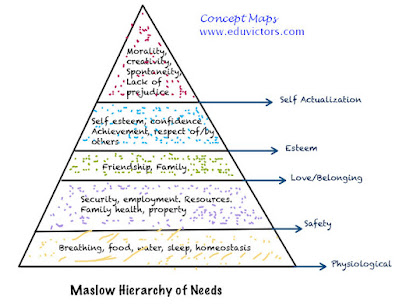Class 12 - Business Studies - Chapter 7 - Directing - Part -2 (Questions and Answers)
Q1: What is meant by ‘Motivation’?
Answer: It refers to that process which encourage people to work for the attainment of a desired objective. It is a psychological term that implies that it cannot be enforced on employees. Motivation means inspiring the employees to work with greater enthusiasm and more efficiency for the accomplishment of the objectives of the enterprise.
Q2: What are the important features of 'Motivation'?
Answer:
① Motivation is an Internal feeling (a psychological term). It cannot be enforced on employees.
② Has Goal Oriented Behaviour - Motivation directs employees to behave in order to achieve their goals.
③ Motivation can be either positive or Negative - Pay increase, rewards, recognition are examples of positive motivation. Demotion, stopping increments, punishments are examples of negative motivation.
④ Motivation is not a straight forward process. It is a difficult and complex task, because people have different expectations and understanding of their needs. Moreover human needs change from time to time.
⑤ Motivation is a continuous process. Human needs are unlimited and keep on changing. Thus managers have to continuously perform the function of motivation.
Q3: Motivation is the process of ___________ people to action to accomplish desired goal. (Fill in the blanks)
Answer: stimulating
Q4: What are the benefits of motivation?
Answer: The importance of motivation can be summarised by the following benefits:
⑴ Motivation enhances performance levels of employees as well as the organisation.
⑵ Motivation turns negative traits of employees to positive attitudes.
⑶ Motivation helps to reduce employee turnover, even engage and inspire staff.
⑷ Motivation helps to reduce absenteeism in the organisation.
⑸ High Motivation helps to reduce resistance to change. Properly Motivated employees accept, introduce and implement these changes keeping the organization effective.
Q5: A _________ need can no longer motivate a person. (Fill in the blank)
Answer: satisfied
Q6: Describe Maslow’s Hierarchy of Needs.
Answer: According to Maslow, man does every work to satisfy his need. A man has various needs and their order can be determined. The needs of a human being serve as a motivation for him.
On the basis of priority human needs can be divided into five parts
(i) Physiological needs,
(ii) Safety needs,
(iii) Affiliation or social needs,
(iv) Esteem needs and
(v) Self-actualization needs.
Q7: What are Financial or Monetary Incentives?
Answer: Financial incentives are those incentives which are evaluated in terms of money. These are helpful to satisfy Physiological and Safety Needs. It includes the following:
(i) Pay and allowances,
(ii) Productivity-linked wage Incentives,
(iii) Bonus,
(iv) Profit sharing,
(v) Co-partnership
(iv) Suggestions,
(vi) Retirement benefits,
(vii) Perquisites.
Q8: What are Non-financial or Non-monetary Incentives?
Answer: Non-financial incentives are not directly related with money. These incentives help in the satisfaction of top hierarchy needs like social, esteem and self-actualization. It includes the following
(i) Status
(ii) Organizational climate
(iii) Career advancement opportunity
(iv) Job enrichment
(v) Employee recognition programmes
(vi) Job security
(vii) Employee participation
(viii) Employee empowerment.
Q9: What is meant by ‘Esteem needs’ and ‘Self-actualization needs’ in relation to motivation of the employees?
Answer:
i. Esteem Needs:
These needs are needs for self esteem and need for other esteem. For Example: Self-respect, self-confidence etc.
ii. Self-actualization Needs:
This is the needs to be what one is capable of becoming and includes needs for optimal development.
Q10: Blue Birds Ltd. Offers to its employees issue of shares at a price which is less than the market price.
(i) Name and explain the type of incentive offered to the employees.
(ii) Explain one more incentive of the same category.
Answer:
(i) Co-partnership/Stock option.
(ii) Other incentives: (a) Pay and allowance, (b) Bonus.
Q11: ABC Ltd. Is not able to achieve its objective on analyzing, they found that employees were not given their best, so he decided to announce an incentive plain, which offers various incentives to employee workers at different level for achieving their target.
(i) Which element of directing is used by manager?
(ii) Suggest incentive suitable for:
a. Employees operating at lower level.
b. Employees operating at higher level.
Answer:
(i) Motivation is missing.
(ii) (a) Lower level: offer monetary incentives.
(b) Higher level: non-monetary incentive.
👉See Also:
CH8: Controlling (Very Short Q & A)



No comments:
Post a Comment
We love to hear your thoughts about this post!
Note: only a member of this blog may post a comment.